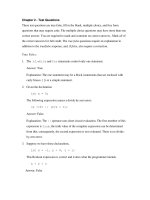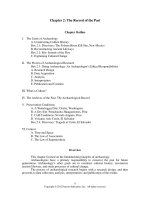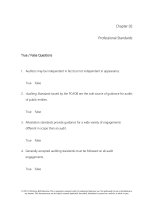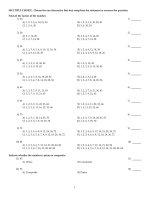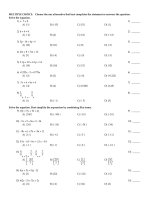Practical management science 5th edition winston test bank
Bạn đang xem bản rút gọn của tài liệu. Xem và tải ngay bản đầy đủ của tài liệu tại đây (49.09 KB, 5 trang )
Chapter 2 - Introduction to Spreadsheet Modeling
1. Which of the following is not one of the components of a mathematical model?
a. Inputs
b. Outputs
c. Decision variables
d. None of these options
ANSWER: d
POINTS: 1
2. Which of the following is not one of the features that can improve the readability of a spreadsheet model?
a. Formatting features
b. Data tables
c. Cell comments
d. Text Boxes
ANSWER: b
POINTS: 1
3. Which of the following is a useful tool for investigating what-if questions?
a. Data tables
b. VLOOKUP function
c. Formula auditing
d. SUMPRODUCT function
ANSWER: a
POINTS: 1
4. The Excel tool for solving one equation with one unknown is:
a. Solver
b. Goal Seek
c. Trend function
d. NPV function
ANSWER: b
POINTS: 1
5. Which of the following is a useful tool for understanding and troubleshooting a spreadsheet model?
a. Data tables
b. VLOOKUP function
c. Formula auditing
d. SUMPRODUCT function
ANSWER: c
POINTS: 1
6. Which of the following is not one of the required arguments for a VLOOKUP function?
a. The lookup table range
b. The value you want to compare to the values in the left column of the table
c. The index of the column you want the returned value to come from
d. TRUE (for an approximate match) or FALSE (for an exact match)
Cengage Learning Testing, Powered by Cognero
Page 1
Chapter 2 - Introduction to Spreadsheet Modeling
ANSWER: d
POINTS: 1
7. Estimating the relationships between variables in a spreadsheet model can be done using:
a. data tables
b. Goal Seek
c. the VLOOKUP function
d. curve fitting
ANSWER: d
POINTS: 1
8. Which of the following is not one of the types of curve fitting models available in Excel's Trendline tool?
a. Exponential
b. Linear
c. Interpolation
d. Power
ANSWER: c
POINTS: 1
9. An important property of the exponential function is that:
a. if x changes by 1 unit, then y changes by a constant percentage that is approximately equal to the model
constant b times 100%
b. if x changes by 1 unit, then y changes by a constant percentage that is approximately equal to the model
constant b%
c. if x changes by 1%, then y changes by a constant percentage that is approximately equal to the model constant
b times 100%
d. if x changes by 1%, then y changes by a constant percentage that is approximately equal to the model constant
b%
ANSWER: a
POINTS: 1
10. To evaluate which of a set of curves fits the data best, we can use:
a. APE
b. MAPE
c. R2
d. NPV
ANSWER: b
POINTS: 1
11. Much of the power of spreadsheet models derives from their flexibility.
a. True
b. False
ANSWER: True
POINTS: 1
12. A shortcut for establishing absolute references is pressing the F9 key.
Cengage Learning Testing, Powered by Cognero
Page 2
Chapter 2 - Introduction to Spreadsheet Modeling
a. True
b. False
ANSWER: False
POINTS: 1
13. A chart is typically much more informative to a business manager than the table of numbers it is based on.
a. True
b. False
ANSWER: True
POINTS: 1
14. Many models are built for the purpose of permitting experimentation with various scenarios.
a. True
b. False
ANSWER: True
POINTS: 1
15. Goal Seek is a means for answering a large number of what-if questions quickly and easily.
a. True
b. False
ANSWER: False
POINTS: 1
16. In Excel terminology, the unknown value used in Goal Seek is called the input cell.
a. True
b. False
ANSWER: False
POINTS: 1
17. Trace Dependents and Trace Precedents are Formula Auditing commands.
a. True
b. False
ANSWER: True
POINTS: 1
18. The NPV function takes two arguments; the discount rate and the number of time periods in the model.
a. True
b. False
ANSWER: False
POINTS: 1
19. In general, any cash flow occurring at the beginning of the first time period must be placed outside the NPV function.
a. True
b. False
ANSWER: True
Cengage Learning Testing, Powered by Cognero
Page 3
Chapter 2 - Introduction to Spreadsheet Modeling
POINTS: 1
20. The HLOOKUP function works exactly the same as the VLOOKUP function, except the lookup table is arranged in
columns instead of rows.
a. True
b. False
ANSWER: False
POINTS: 1
Exhibit 2-1
A t-shirt company is planning a production run for an event where the attendance (and thus demand for t-shirts) is
uncertain. The event planners have indicated that they think the attendance will be 500, 750 or 1000, with probabilities of
30%, 50% and 20% respectively. The company must pre-order the blank t-shirts (cost=$5 per shirt) and it can sell finished
shirts for $12 apiece. Any finished shirts that cannot be sold at the event can be sold for $2 apiece to a used clothing
vendor.
21. Refer to Exhibit 2-1. What Excel function is useful for calculating the expected value of demand for t-shirts? What is
the expected demand?
ANSWER: The SUMPRODUCT function is useful for multiplying the respective probabilities times the demand
outcomes and summing the products. The expected value is 725.
POINTS: 1
22. Refer to Exhibit 2-1. What Excel function is useful for calculating revenue? Explain why it is useful.
ANSWER: The IF function is useful for calculating revenue. This because there are two difference cases; demand could
exceed production, in which case only the amount produced can be used to calculate revenue, and demand
could be less than production, in which case only the demand can be used to calculate revenue.
POINTS: 1
23. Refer to Exhibit 2-1. What are the two possible cases for the amount of t-shirts that will be sold to the used clothing
vendor? How would you calculate this amount in a spreadsheet model?
ANSWER: The company will either sell no t-shirts to the used clothing vendor (if it produces less than demand) or it will
sell a surplus equal to the difference between production and demand (if it produces more than demand). This
logic can be implemented in a spreadsheet model using an IF statement.
POINTS: 1
24. Refer to Exhibit 2-1. Suppose that blank t-shirts can only be ordered from the wholesale vendor in batches of 100?
How many t-shirts should the company order?
ANSWER: We can set up a one-way data table with net profit as the output and order as the input (with trial quantities of
500, 600, 700, 800, 900, and 1000), which shows that the net profit is maximized at $4900 with an order of
700 shirts.
POINTS: 1
25. Refer to Exhibit 2-1. Suppose now that blank t-shirts can only be ordered from the wholesale vendor in batches of 50?
How many t-shirts should the company order?
ANSWER: We can again set up a one-way data table with net profit as the output and order as the input (with trial
quantities of 600, 650, 700, 750, and 800), which shows that the net profit is maximized at $5000 with an
order of 750 shirts.
POINTS: 1
Cengage Learning Testing, Powered by Cognero
Page 4
Chapter 2 - Introduction to Spreadsheet Modeling
Exhibit 2-2
A small sporting goods company is considering investing $2000 in a project at the start of year 1 that will produce
volleyballs over the next five years. The company plans to produce and sell 200 volleyballs in the first year, and expects
that volume to grow by 10% each year thereafter. The unit selling price forecast the company has developed is $20 in year
1, $22 in year 2, $25 in year 3, $28 in year 4, and $31.50 in year 5. Variable costs are forecast to be $15 per unit produced,
and there will be a fixed overhead cost in each year of $500. (Unless otherwise indicated, assume that all cash flows
occur at the end of the year.)
26. Refer to Exhibit 2-2. Use the above information to develop a simple cash flow proforma sheet, and then apply Excel's
NPV function to calculate the project value assuming a 10% discount rate. What is your answer?
ANSWER: The project NPV is $5,468.24 (allowing for a fraction of a volleyball)
POINTS: 1
27. Refer to Exhibit 2-2. Suppose the company thinks it may be able to produce and sell more than currently planned.
What growth rate of production would produce an NPV of $10,000?
ANSWER: Using Excel's Goal Seek function, the required growth rate would be 27.4% per year.
POINTS: 1
28. Refer to Exhibit 2-2. Suppose instead that the company thinks it can reduce its variable cost rate. What rate would
produce an NPV of $10,000?
ANSWER: Using Excel's Goal Seek function, the required variable cost rate would be $10.02 per unit of production.
POINTS: 1
29. [Part 1] Refer to Exhibit 2-2. Use the graphing function in Excel to construct a scatterplot of forecasted price versus
time, and fit a linear trendline to the data. What are the coefficients of the linear model, and what is the MAPE of a linear
model forecast, compared to the company's forecast?
ANSWER: The linear trend fit produces an intercept of 16.6 and a slope of 2.9. Forecasting with this model and
comparing against the company forecast results in a MAPE of 1.5%.
POINTS: 1
30. [Part 2] Refer to Exhibit 2-2. Use the same scatterplot constructed for the previous question, fit an exponential
trendline to the data. What are the coefficients of the exponential model, and what is the MAPE of an exponential model
forecast, compared to the company's forecast?
ANSWER: The exponential model fit produces a constant of 17.684 and an exponent of 0.115. Forecasting with this
model and comparing against the company forecast results in a MAPE of 0.47%
POINTS: 1
Cengage Learning Testing, Powered by Cognero
Page 5
